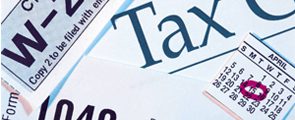 It’s that time of the year again when most folks usually have one thing on their mind — meeting that tax return deadline.
It’s that time of the year again when most folks usually have one thing on their mind — meeting that tax return deadline.
They often ask themselves, “How much will I be receiving this year in tax returns?” or, more dauntingly, “How do I dig through my records and get started?”
All these questions can easily be answered when you have the correct information to assist you, someone with the right knowledge to back up their advice. It’s all too easy to be sucked into the whirlwind of confusion that accompanies the tax code, but everyone has a right to know where he or she stands and what is required. Unfortunately, some people fall short when it comes to finding the right guidance, which in turn, can leave less money in the person’s pocket.
Also, when you’re looking at things you can deduct, keep in mind that you may have the ability to put money into an IRA, SEP, or SIMPLE plan, depending on your income and needs. Your contributions to these generally are deductible and this helps you plan for your future as well.
If you run your own business, you have to be especially cognizant of your tax responsibilities. A sole proprietor must file a Schedule C with your personal income tax return (1040). Even if you don’t sell a thing, yet your intent is still to produce income, you still have a business in the eyes of the IRS. The IRS won’t let that go on forever, but it does consider the fact that starting a business takes some time. Consequently, you should be able to deduct almost all of your expenses.
However, some things can be deducted now, but some things must be depreciated over the expected life of the item. For instance, office supplies and utilities can be taken in one year, but buildings and equipment must usually be depreciated. What you can deduct and how it’s deducted depends on what the business is, where it’s located, and how it operates. Whether or not you need an accountant depends how good you are at keeping records on your own.
According to a recent survey, 60 percent of people seek help in preparing their taxes from a tax professional or accountant and 24 percent received help from computer software or an online service. In addition, younger respondents were more likely to use computer software or online services compared to older individuals.
Respondents with higher household incomes and higher levels of education also were more likely to use computer software or online services. Twenty percent of people received help from their spouse, while 15 percent sought help from friends or other family members. There were no significant differences among respondents of different ages, income levels, or education that used a tax professional or accountant.
When searching for proper tax managing guidance, look for a CPA who specializes in taxes. There are plenty of small firms that will prepare your taxes for a reasonable price.
Watch Al Sunshine’s “Money Watch” reports Monday-Friday beginning at noon. You may find Al’s blog at cbs4.com/4yourmoney.






